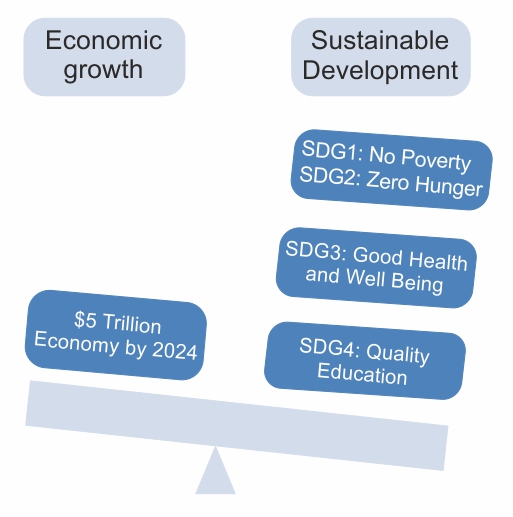-
Q. Without investing in human capital, the goal of becoming a $5 trillion economy will remain a pipe dream for India. Discuss. (250 words)
25 Sep, 2019 GS Paper 3 EconomyApproach
- Explain the relevance of economic growth and need for sustainable development in the introduction.
- Mention the steps taken by the government in human capital formation.
- Mention steps to increase investment in human capital in the way forward.
Introduction
India continues to remain one of the fastest growing economies in the world. Despite recent slowdown, India’s growth of real GDP has been high with average growth of 7.5% in the last 5 years as per Economic Survey 2018-19.
However, there are structural problems like non-inclusive growth, jobless growth, inadequate spending on social infrastructure and unsustainable development. Economic growth should be in consonance with other major developmental goals like improvement in education, health, expansion in productive employment for all and environmentally sustainable development.
Body
Human capital and its significance:
Human Capital is a measure of the skills, education, capacity and attributes of labour which influence their productive capacity and earning potential. Investment in human capital is needed for technological growth, improving productivity, creating social innovations, etc.
Steps taken by the government:
- Health: Ayushman Bharat Yojana aims at making interventions in primary, secondary and tertiary care systems, to address healthcare holistically.
- Skills: Skill India Mission launched to fulfill the growing need in India for skilled manpower across sectors.
- Education: Samagra Siksha Abhiyan, which subsumed the three erstwhile schemes of Sarva Shiksha Abhiyan (SSA), Rashtriya Madhyamik Shiksha Abhiyan (RMSA) and Teacher Education (TE) aims to provide equal opportunities for schooling and equitable learning outcomes.
- Employment: Increase in wages of rural employment scheme MNREGA to boost rural domestic demand and improve livelihood opportunities for the poor.
Way Forward
- Investment in SHE (Skill, Education and Health): There is a need to increase government spending in these areas to create a healthier, smarter and competitive workforce.
- Industrial training: Incentives should be provided to job creating sectors like IT, BPOs, diamond, textiles industry, leather industry, etc for on the job training and skilling of workers.
- Use of technology: With rising internet penetration, government should collaborate with industry leaders to create online tutorials in local regional languages to impart knowledge and skills to all.
- Reviving agriculture sector: Rural youth should be promoted to adapt to new methodologies of farming which are in high demand. For ex: organic farming, aquaponics, drip irrigation techniques, etc.
- Promoting labour-intensive sectors such as gems and jewellery, textiles and garments and leather goods.
- Investment in infrastructure: Good transport, communication, availability of mobile phones and the internet are very important for the development of human capital in any developing economy.
By increased investment in human capital formation, we can reap the benefits of our demographic dividend. Human capital is an important asset for the economy as it boosts domestic demand and consumption spending. Hence, investing in human capital formation is critical for achieving the goal of $5 trillion economy.
To get PDF version, Please click on "Print PDF" button.
Print PDF





